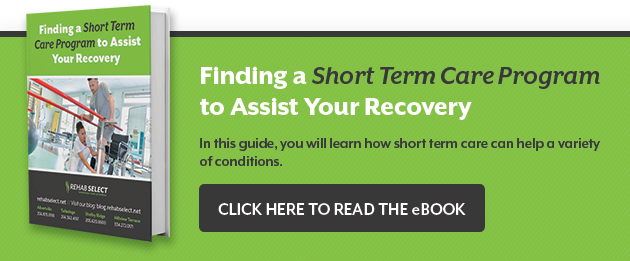 Healing from knee surgery takes time, patience, and determination. But you can fast-track your recovery with proper rehab. Knowing what to expect and how to become an active participant in your treatment can help shorten knee surgery recovery time.
Healing from knee surgery takes time, patience, and determination. But you can fast-track your recovery with proper rehab. Knowing what to expect and how to become an active participant in your treatment can help shorten knee surgery recovery time.
What Does Rehab After Knee Surgery Entail?
Rehab after knee surgery is an essential part of the recovery journey, whether you’ve had a total knee replacement, ACL reconstruction, or another procedure. The process helps you restore strength, flexibility, and function, shortening knee surgery recovery time and enabling you to return to your daily activities.
Rehab after knee surgery typically begins within 24 hours of surgery, often while you're still in the hospital. It initially focuses on gentle movements to improve circulation, reduce swelling, and prevent stiffness. Then, therapists will adjust the program based on your progress to rebuild your mobility and stability.
Here are the key components of a knee surgery rehab program:
- Physical Therapy. Customized exercises strengthen muscles, improve range of motion, and retrain balance.
- Pain Management. Ice therapy, medication, guided movement, and other techniques help manage discomfort and promote healing.
- Mobility Training. Assistive devices like crutches or a walker help you start walking until your knee improves.
- Functional Exercises. Activities that mimic everyday movements like climbing stairs or getting in and out of a car help you regain independence.
Your care team will tailor the rehab program based on your procedure, physical condition, and recovery goals. You can maximize the long-term benefits by adhering to their guidance and instructions.
The Benefits of Rehab After Knee Surgery
Rehab after knee surgery isn’t just a checkbox item — it’s essential for accelerating recovery and maximizing treatment outcomes. A well-structured rehabilitation program helps you heal properly, regain mobility, and return confidently to the activities you enjoy.
Rehab exercises and techniques help reduce swelling, restore movement, and rebuild strength faster than resting alone. The sooner you start moving under the supervision of a rehab professional, the earlier your body begins the healing process.
Meanwhile, guided mobility exercises improve joint function, allowing your knee to bend, straighten, and bear weight without stiffness or straining other joints. Rehab exercises also help manage pain through movements that support healing and minimize discomfort.
Rehab programs reduce the risk of blood clots, scar tissue buildup, and long-term mobility issues. They also help you achieve better alignment to prevent future injuries. Moreover, physical therapy targets the muscles that support your knee to help you regain balance, coordination, and confidence in your movement.
A well-designed rehab program supported by a professional care team empowers you to take control of your recovery. You must also actively participate in your treatment to maximize the benefits and accelerate recovery.
How To Shorten Knee Surgery Rehab Time
While your physical condition and the nature of the surgery affect your rehab timeline, you can take steps to speed up recovery. Being proactive significantly impacts how quickly and smoothly you move through rehab. Here’s how to set yourself up for success:
Prepare Your Body and Mind Before Surgery
Thorough preparation sets the stage for a speedy recovery. Many hospitals and orthopedic centers offer pre-surgery education programs for joint replacement patients to learn what to expect before, during, and after knee surgery. The information also helps ease the process by reducing stress and uncertainty.
These programs offer practical tips for preparing your body for surgery. For example, you can learn about exercises, nutrition, and other habits to support healing. When you go into surgery with a well-prepared body and a calm, informed mindset, you become more confident in taking charge of your recovery process.
Commit Fully to Rehab and Recovery
Effective rehabilitation is intensive. Yet, staying consistent and committed to your treatment plan is the best way to bounce back quickly. A short-term, in-patient program offers a structured environment to help you build strength, mobility, and confidence through hands-on, supervised therapies several times a day.
Your recovery journey doesn’t end when you leave short-term rehab. You must attend follow-up appointments, continue performing exercises, and attend therapy sessions as prescribed. Care teams at reputable facilities like Rehab Select help you orchestrate a seamless transition during discharge planning to support your progress.
Set Up Your Home for a Safe, Stress-Free Recovery
Returning home to a well-prepared environment makes your transition smoother and more manageable. A few preparations can go a long way: Stock your fridge and pantry with healthy, easy-to-make meals, clear walkways for easy navigation, and install safety equipment like grab bars or shower chairs.
Line up help with errands, household tasks, and transportation to follow-up appointments. Trusted rehab facilities like Rehab Select involve family members in discharge planning to ensure they understand how to set up the home environment to support healing and minimize stress.
Trusted Knee Surgery Rehab in Alabama
Rehab after knee surgery takes time, effort, and patience. Proper planning, commitment to your rehab program, and a recovery-friendly home environment help shorten knee surgery rehab time. Additionally, the right in-patient program makes the process smoother, faster, and more effective.
Rehab Select is a trusted short-term rehabilitation facility in Alabama. We support patients in their recovery journey after surgery, injuries, and illnesses to regain their functions and independence. Schedule a tour at one of our locations in Alabaster, Talladega, Montgomery, Albertville, or Guntersville to see our professional care teams in action.





